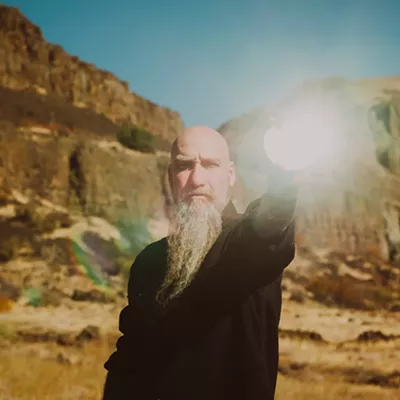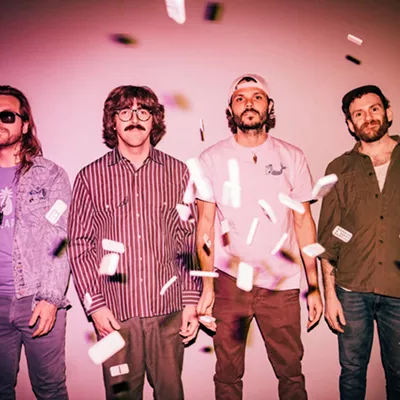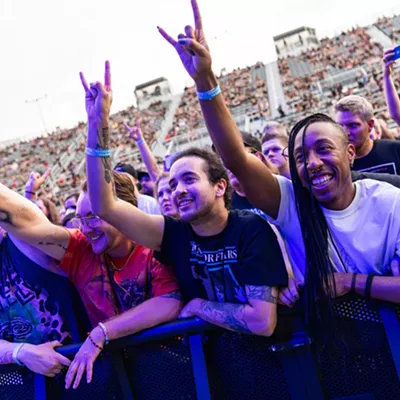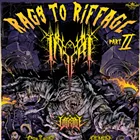The film Freestyle: The Art of Rhyme has considerable footage of the hip-hoppenings surrounding the Goodlife. As it simultaneously pushed free-talking (spirited open-mic nights) and smart-living (healthy food) agendas, the Goodlife and its outlying concrete areas became a symbol of a particular strain of late-'90s Cali-rap, a free-form, anti-commercial style that placed heavy emphasis on spontaneity and creativity. Subsequently, the hip-hop-friendly Caf & eacute; became a crucial spawning grounds for many a bugged-out rhyme style. Freestyle's Goodlife footage is of the Caf & eacute;'s "golden era," around 1996-97, when groups like the Living Legends and Freestyle Fellowship swelled with auxiliary members hungry to rhyme.
The mobs of rhyming weirdos surrounding Goodlife consisted of mostly gibberish-speakers, "emcees" drunk on a kind of anti-gangsta reflex that seemed to legitimize pretty much any flow or topic as long as it was unusual and original. Indeed, a terrible breed of rapper was born of these proceedings: the spaced-out, New Age metaphysical blowhard, a rapper we've yet to see the last of. While the vast majority of Goodlifers were underdeveloped babblers united by hate (of all things "shallow" and "soulless" -- i.e., West Coast gangsta rap and its nihilistic seeds of ignorance) and love (of all things "deep" and "soulful" -- i.e., philosophical thought and beat poetry), there existed a few geniuses in the eye of the storm. And despite being written off as vegetarian queers by the trunk-thumping. gat-toting masses, the free-thinking scene developed its own safety net of adherents.
One that emerged from that amorphous cipher of creativity was our man Busdriver -- he of the schizophrenic, homeless flow -- and though he might have been initially indistinguishable from the mess of verbal diarrhea, he rose above the incessant meta-dissing by virtue of his own personality. Ever the sardonic, sarcastic, annoying observer, Busdriver rapped absurd, creating humorous allegories and situational comedies. He brought to the world the quintessential writer's view: he saw a story in everything. Though his vicious "oh, snap!" brand of humor and near-psychedelic visual rhymes endeared him to the Blowed set, his ability to weave sense into his visions proved him a truly lucid dreamer. An example from his first album, Memoirs of the Elephant Man, is on "Get on the Bus," a track wherein Busdriver is actually driving a bus, making stops and picking up passengers.
Busdriver rhymes with a lot up front -- a lot of syllables, a lot of feeling, a lot of phonetic tension -- but he's never flying off the handle nearly as recklessly as he appears. A grand enunciator, Bd has a pompous, writerly love of his own words that spurs him to meet his creative visions with feats of locution. He may be off the wall, but he's out to be understood, which is a good thing for his likeability. For as many chances as he takes with cadence, word and track choices, his intent is never to confound.
Whether he's one step ahead of other indie-rock/IDM/undie-rap mash-up artists (evidenced in collaborations with the Unicorns and Daedalus) or just one step ahead of Cali-hip-hop (as heard through his wonderful chemistry with beatsmith Daddy Kev), Busdriver has all tools to get noticed by Pitchfork, Vibe, and The New Yorker. He's doing everything he should to be huge: He raps about culture, raps futuristic about the black-hole implosion of our ever-denser subjectivities, deals with art-culture gray areas, shading with art-rock/art-rap cross-hatches, and remains inspired aloft a carbonated wavelength, an intuitive love of all sounds kinetic. Instead, he releases albums only available in the UK and remains -- in the world's most ruthless taste-making circles -- merely blip-worthy.
All that may change with his new album, Fear of Black Tangent. On ultra-chic Big Dada/Ninja Tune Records (Danger Mouse, MF DOOM), Bd has blended his Project Blowed pedigree with his musical outreach endeavors. Heavy-hitting Blowed emcees (Mikah-9, Abstract Rude, 2Mex) guest alongside past collaborator Daedalus and Danger Mouse on the production tip, blending Busdriver's distinct battle-tinged rantings with adventurous soundscapes and song structures.
The Goodlife tornado launched many an emcee into the world's network of jet streams and trade winds. A few are still flying, but the storm that propelled them has long quieted. Gone are the days when a loquacious, hyper emcee could draft behind the sky-blazers, yet Busdriver stays aloft with the full force of the wind in his face.
& r & Busdriver with Pigeon John, Akrobatik (of the Perceptionists) and Caural at Mike Krock's birthday party, 8107 S. Inland Empire Way, all day Saturday, Sept. 23. $30 at door. No contact info available. & r &















